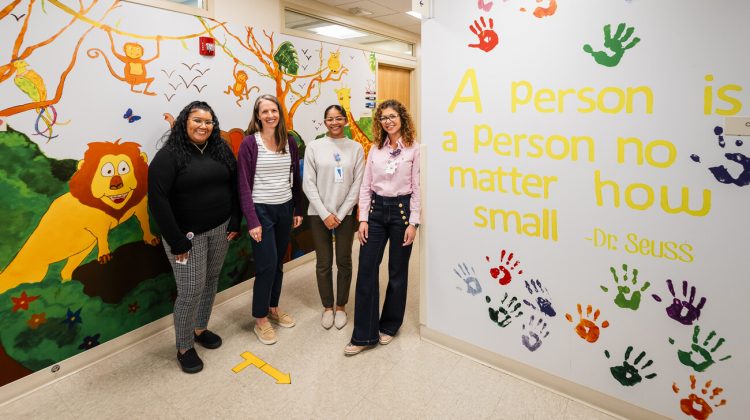LYNN — Lynn Community Health Center is one of 13 sites across the Commonwealth to prioritize the wholesome health of families by opening a HealthySteps program.
The program, which launched at Lynn Community Health Center (LCHC) approximately a year ago, provides integrated behavioral health and perinatal care while providing postpartum and maternal support to families from as early as when the child is one month old to age 3 years old.
Some of what the program provides families with resources such as behavioral screening, maternal screening, and a support line via telephone or in person.
Program Manager Diana Westerberg said the program now sees 315 families.
“You’re creating a foundation for the family at such a critical period, and so you’re able to work on the attachment, the routines, all of that will carry forward beyond those first three years of life,” she said.
Behavioral Health Specialist Diana Garcia, who said she sees approximately 10 families per day, said her primary role is to assist patients with any perinatal mood and anxiety disorders and do psychoeducation and intervention.
Garcia said as mental health can be stigmatized, particularly in Hispanic culture — Hispanic families being the majority of those they serve — it is critical, even for mothers who may have other kids, to have the opportunity to speak to a clinician and discuss developmental growth concerns and what steps they can take to promote the health of their child on a regular basis.
“We know that the perinatal period can be so vulnerable,” she said. “I think just giving them the opportunity to connect with someone, even if it’s over the phone,” is a helpful resource.
Garcia said often she will have mothers telling her, “‘It feels like you’re understanding this, and you’re giving me the support that I’ve never heard from anyone else about.’”
She said the program has three tiers. Tier one is universal, every infant who is at the clinic and has a primary care provider is in this tier.
Patients who are in tier two receive check-ins once a month for help with parenting strategies. She said parents whose children might be having trouble sleeping, or are picky eaters might be in this category.
“Things that are typical for development, but also we understand that parents need support with it,” she said.
She said patients in tier three were seen on average once a week depending on the parent’s schedule and this is usually for parents with children who are are risk for more developmental delays
She said the program is a great opportunity to emphasize the importance of consistent care during the first few years of a child’s life and to provide support to mothers.
“Having that consistent person checking in week by week, asking them if they need some kind of support … because we also see some maternal depression,” is a great opportunity Garcia said.
A Healthy Steps parent, Lidenny Alvarez, who spoke to The Item with an English translator, said she and her one year old daughter were referred to the program because her daughter was being picky with her food.
Alvarez has been with the program for four months and she said the advice she has received from the team has been incredibly helpful in getting her baby to eat better.
For example, Alvarez said advice that worked was that rather than cooking different meals for her baby than the ones she was already making, she should give her time and space to eat them.
She added she feels very welcomed at the community health center and feels very happy with the program as it has helped her baby to eat a lot more.
Also on the Healthy Steps team is Community Health Worker Isabelle Giannopoulos works with patients to connect them with resources on social determinants of health such as food insecurity, housing, and transportation.
Giannopoulos may help patients secure transportation to their appointments or referrals to early intervention.
She said a reason why the program works so well is that all of the health professionals are focused on specific areas of outreach with patients, they are all “tight knit” and work closely to figure out what’s best for patients.
Pediatrician Dr. Gouri Scheurmann said sometimes she will receive pushback when making referrals to the HealthySteps program because parents can feel overburdened by the number of specialist appointments they attend. She added, some parents will also question why children so young need behavioral specialists.
She said she counteracts this by emphasizing how if a child is struggling to sleep or behave at home or in public places, it can be mediated with strategies given by a psychologist.
“In the first three years of life, there are a lot of changes in the development of a brain of a child, and we need to target any developing issues at an early age,” she said.
Scheurmann said since the program primarily serves an underserved population, it is nice to think that the team is able to provide the support and be an open ear to those who may not receive it through the traditional healthcare system.
“Our patients in these early years are getting what they need, and it’s not only for the best development of the children, but also for the family itself,” she added.

